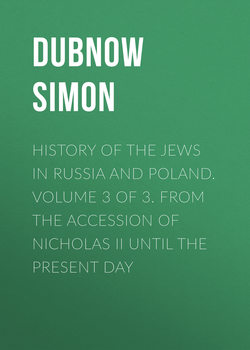Читать книгу History of the Jews in Russia and Poland. Volume 3 of 3. From the Accession of Nicholas II until the Present Day - Dubnow Simon - Страница 9
CHAPTER XXXII
THE NATIONAL AWAKENING
2. Spiritual Zionism, or Ahad-Ha´amism
ОглавлениеAnd yet, political Zionism viewed as a theory failed to offer a satisfactory solution of the great Jewish problem in all its historic complexity. Born of the reaction against anti-Semitism, and endeavoring to soothe the pain of the wounded Jewish heart, it was marked by all the merits and demerits of a theory which was substantially Messianic in character and was entirely dependent on subjective forces, on faith and will-power. "If you only will it, then it is no fairy tale"19– in these words the ultimate goal of political Zionism is indicated by its founder, who firmly believed that an extraordinary exertion of the national will would transform the fairy tale of a "Jewish state" into reality. When confronted with the question as to the future of the Jewish nation in case faith and will-power should prove unable to grapple with the conditions over which it had no control, and the "fairy tale" of a united political autonomous center should not be realized, political Zionism either remained silent or indulged in a polemical retort which was in flagrant contradiction to Jewish history: "Without Zion, Judaism is bound to perish." The national conscience, however, could not be reconciled to such an answer. A more or less satisfactory solution of the problem of Judaism could not spring from the external reaction against anti-Semitism, but could only mature as the fruit of profound contemplation of the course of development pursued by the Jewish people in the Diaspora; such a solution could only be found in the endeavor to adapt the new national movement to this historic course. From this point of view political Zionism was rectified by "Spiritual Zionism," the teaching of the publicist and philosopher Ahad Ha'am (U. Ginzberg).
Even before political Zionism, or "Herzlianism," appeared on the scene, Ahad Ha'am had succeeded in substantially modifying the Palestinian idea as formulated by Lilienblum and Pinsker. In the program of the semi-Masonic order Bne Moshe ("Sons of Moses"), established by him in Odessa,20 he laid down the fundamental principle that the preparation of the land for the people must be preceded by the transformation of the people into a firmly-knit national organization: "We must propagate the national idea, and convert it into a lofty moral ideal." Having become associated with the Palestinian colonization in a practical manner, as a leading member of the Odessa Palestine Society, founded in 1890,21 Ahad Ha'am indefatigably preached that the significance of this microscopic colonization was not to be sought in its economic results, but in its spiritual and cultural effects, in establishing upon the historic soil of Judaism a nursing-ground for a pure national culture which should be free from foreign admixture, and from the inevitable cultural eclecticism of the Diaspora. After the spectacular appearance of political Zionism on the Jewish stage this fundamental idea of "Neo-Palestinianism" was more fully elaborated by Ahad Ha'am, assuming the shape of a comprehensive doctrine, known as the doctrine of "Spiritual Zionism." When the first Basle Congress was over, Ahad Ha'am declared that the "Jewish State," as formulated by Herzl, was beyond realization, for the reason that, under the prevailing circumstances, it was entirely impossible to transfer to Palestine the whole Diaspora, or even a substantial part of it. Consequently, the Palestinian colonization could not put an end to the material "Jewish misery," whereas a small Jewish center, gradually rising in Palestine, might, with the help of a proper organization, solve the national-spiritual problem of Judaism. The formation of a spiritual center in the historic homeland of the nation, the creation in that center of a Jewish national school, the revival of the Hebrew language as a medium of daily speech, the untrammelled development of a Jewish culture, without the pressure of a foreign environment – such in short he held to be the true goal of the Palestine idea. A "publicly and legally assured home for the Jewish spirit" of this kind would exert an uninterrupted nationalizing influence upon the Diaspora, serving as a living center of attraction for a genuine Jewish culture, and acting like a focus which scatters its rays over a large periphery.
The Zionist doctrine of Ahad Ha'am, as a counterbalance to official Zionism which was hall-marked by the "Basle Program," led to interminable discussions among the partisans of the movement. It did not succeed in creating a separate party or a special public agency for its realization; yet the elements of that doctrine have mingled in a larger or lesser degree with the views of the political Zionists in Russia, and manifested themselves in the protests of the cultural Zionists against the extreme political advocates of the movement at the Zionist Congresses. The Zionist Convention at Minsk, referred to previously, resulted in a partial triumph for the ideas championed by Ahad Ha'am, who submitted a report on the "Spiritual Regeneration of Judaism."22 The Convention adopted a resolution calling for a larger measure of cultural work in the schedule of the party activities, but rejected at the same time the proposal of the referee to create a Jewish world organization for the revival of Jewish culture, on the ground that such an organization might destroy the political equilibrium of Zionism.
19
The motto prefixed to Herzl's Zionistic novel Altneuland.
20
It was founded in 1889 and disbanded in 1897.
21
[See vol. II, p. 421 et seq.]
22
[Ahad Ha'am's report is embodied in the second volume of his collected essays (Berlin, 1903) under the title Tehiyyat ha-Ru'ah, "The Spiritual Revival." An English version of this article is found in Leon Simon's translation of Ahad Ha'am's essays (Jewish Publication Society of America, Philadelphia, 1912), p. 253 et seq.]
